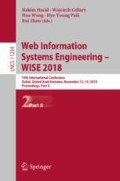Abstract
Generative adversarial networks (GAN)-based approaches have been extensively investigated whereas GAN-inspired regression (i.e., numeric prediction) has rarely been studied in image and video processing domains. The lack of sufficient labeled data in many real-world cases poses great challenges to regression methods, which generally require sufficient labeled samples for their training. In this regard, we propose a unified framework that combines a robust autoencoder and a generative convolutional neural network (GCNN)-based regression model to address the regression problem. Our model is able to generate high-quality artificial samples via augmenting the size of a small number of training samples for better training effects. Extensive experiments are conducted on two real-world datasets and the results show that our proposed model consistently outperforms a set of advanced techniques under various evaluation metrics.
Access this chapter
Tax calculation will be finalised at checkout
Purchases are for personal use only
References
Ning, X., et al.: Rating prediction via generative convolutional neural networks based regression. Pattern Recognit. Lett. (2018)
Andreas, C., Steinwart, I.: Consistency and robustness of kernel-based regression in convex risk minimization. Bernoulli 13(3), 799–819 (2007)
Hu, H., Qi, G.-J.: state-frequency memory recurrent neural networks. In: ICML (2017)
Suk, H.I., Lee, S.W., Shen, D.: Deep ensemble learning of sparse regression models for brain disease diagnosis. Med. Image Anal. 37, 101–113 (2017)
Ning, X., Yao, L., Wang, X., Benatallah, B.: Calling for response: automatically distinguishing situation-aware tweets during crises. In: Cong, G., Peng, W.-C., Zhang, W.E., Li, C., Sun, A. (eds.) ADMA 2017. LNCS (LNAI), vol. 10604, pp. 195–208. Springer, Cham (2017). https://doi.org/10.1007/978-3-319-69179-4_14
Liu, M.-Y., Tuzel, O.: Coupled generative adversarial networks. In: Advances in Neural Information Processing Systems (2016)
Chong, Z., Paffenroth, R.C.: Anomaly detection with robust deep autoencoders. In: Proceedings of the 23rd ACM SIGKDD (2017)
Goodfellow, I., et al.: Generative adversarial nets. In: NIPS (2014)
Eliashberg, J., Hui, S.K., John, Z.J.: Assessing box office performance using movie scripts: a kernel-based approach. TKDE 26(11), 2639–2648 (2014)
Gerber, M.S.: Predicting crime using Twitter and kernel density estimation. Decis. Support Syst. 61, 115–125 (2014)
Huang, S., et al.: Regression-based hypergraph learning for image clustering and classification. arXiv preprint arXiv:1603.04150 (2016)
Zhang, L., Aggarwal, C., Qi, G.-J.: Stock price prediction via discovering multi-frequency trading patterns. In: Proceedings of the 23rd ACM SIGKDD (2017)
Montero, J.-M., Mínguez, R., Fernández-Avilés, G.: Housing price prediction: parametric versus semi-parametric spatial hedonic models. J. Geogr. Syst. 20(1), 27–55 (2018)
Radford, A., Metz, L., Chintala, S.: Unsupervised representation learning with deep convolutional generative adversarial networks. arXiv preprint arXiv:1511.06434 (2015)
Author information
Authors and Affiliations
Corresponding author
Editor information
Editors and Affiliations
Rights and permissions
Copyright information
© 2018 Springer Nature Switzerland AG
About this paper
Cite this paper
Ning, X., Yao, L., Wang, X., Benatallah, B., Zhang, S., Zhang, X. (2018). Data-Augmented Regression with Generative Convolutional Network. In: Hacid, H., Cellary, W., Wang, H., Paik, HY., Zhou, R. (eds) Web Information Systems Engineering – WISE 2018. WISE 2018. Lecture Notes in Computer Science(), vol 11234. Springer, Cham. https://doi.org/10.1007/978-3-030-02925-8_21
Download citation
DOI: https://doi.org/10.1007/978-3-030-02925-8_21
Published:
Publisher Name: Springer, Cham
Print ISBN: 978-3-030-02924-1
Online ISBN: 978-3-030-02925-8
eBook Packages: Computer ScienceComputer Science (R0)

